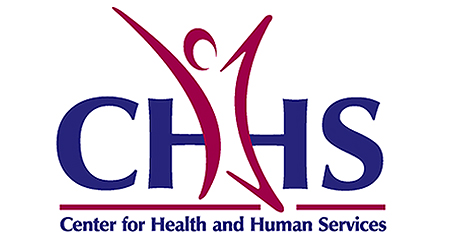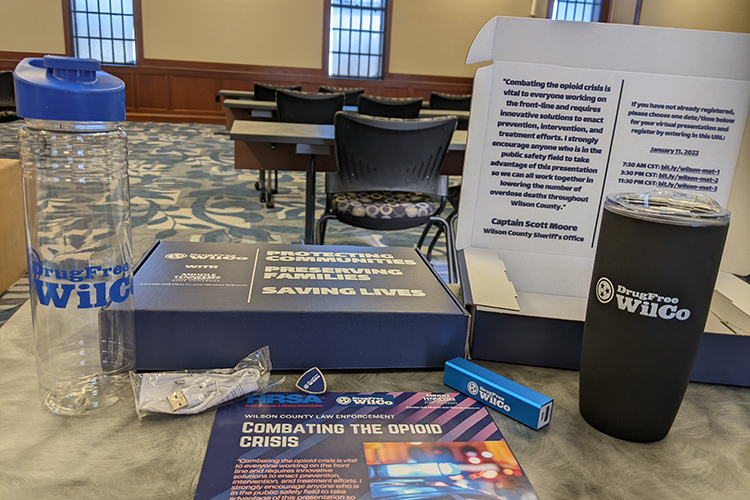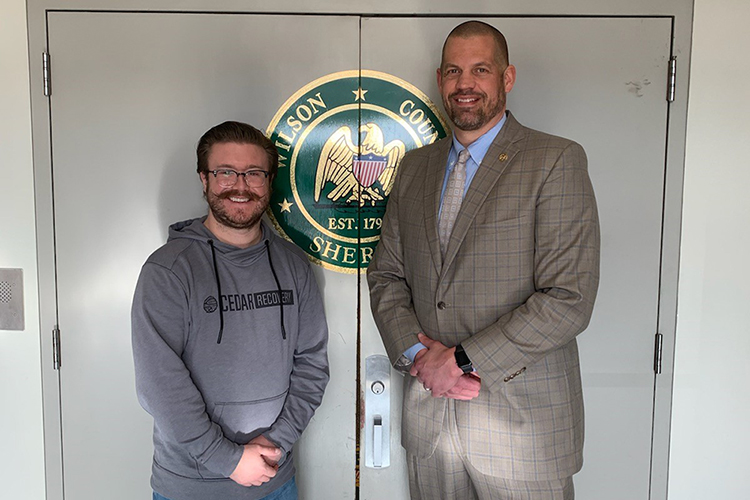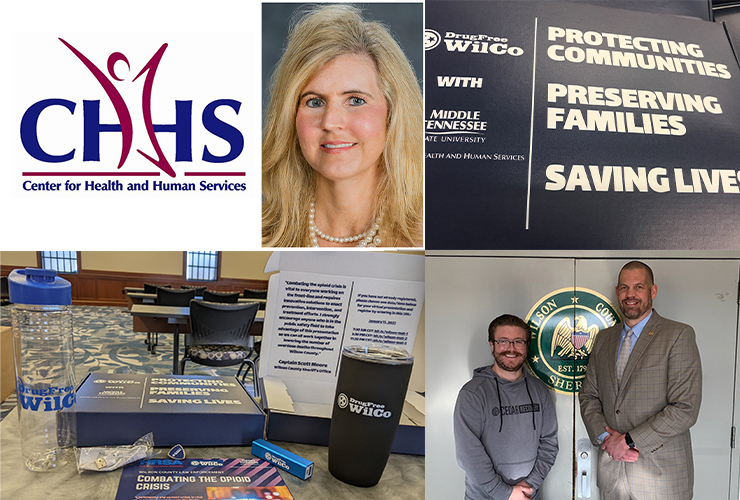The Center for Health and Human Services at Middle Tennessee State University, in partnership with DrugFree Wilco, is helping train more than 100 law enforcement officers in Wilson County through a series of recent educational sessions about opioid use disorder.
 The virtual training was made possible through $200,000 that CHHS received last year from the Health Resources and Services Administration, a branch of the U.S. Department of Health and Human Services, as part of an 18-month planning grant to address the opioid epidemic in rural Wilson County communities.
The virtual training was made possible through $200,000 that CHHS received last year from the Health Resources and Services Administration, a branch of the U.S. Department of Health and Human Services, as part of an 18-month planning grant to address the opioid epidemic in rural Wilson County communities.
 Retired New York Police Department officer Ron Martin led the sessions, which explored the intersection and importance of law enforcement and public safety officials working within a harm reduction model. Sentiment has grown that first responders, in the role of frontline triage, are crucial to lowering the increasing number of overdose deaths nationwide.
Retired New York Police Department officer Ron Martin led the sessions, which explored the intersection and importance of law enforcement and public safety officials working within a harm reduction model. Sentiment has grown that first responders, in the role of frontline triage, are crucial to lowering the increasing number of overdose deaths nationwide.
“As we witness a tragic surge in overdose deaths, law enforcement is at the frontlines to combat this loss of life,” Martin said. “The enforcement of drug laws is an integral part of police work, but we also realize that we will not solely arrest our way out of this problem and need to offer these men and women protecting our communities additional tools.”

MTSU’s Center for Health and Human Services, in partnership with DrugFree Wilco, developed these outreach and education training packages for law enforcement officers in Wilson County as part of a series of recent educational sessions held virtually about opioid use disorder. (Submitted photo)
The Rural Communities Opioid Response Program is a multiyear initiative supported by the U.S. Health Resources and Services Administration to address barriers to access in rural communities related to substance use disorder, including opioid use disorder.
 CHHS has worked the last 17 months in partnership with volunteer advocacy group DrugFree Wilco in Wilson County, public health faculty from the Department of Health and Human Performance in the MTSU College of Behavioral and Health Sciences, as well as the MTSU Data Science Institute and other on- and off-campus partners to complete a needs assessment and gap analysis as part of the planning grant and to begin early stage implementation activities.
CHHS has worked the last 17 months in partnership with volunteer advocacy group DrugFree Wilco in Wilson County, public health faculty from the Department of Health and Human Performance in the MTSU College of Behavioral and Health Sciences, as well as the MTSU Data Science Institute and other on- and off-campus partners to complete a needs assessment and gap analysis as part of the planning grant and to begin early stage implementation activities.
A needs assessment recommended training for law enforcement personnel on current issues surrounding opioid use disorder, including treatment and prevention of opioid-related deaths.
Combating the opioid crisis requires innovative solutions to enact prevention, intervention and treatment efforts. The training sessions introduced harm-reduction, evidence-based programs, including Medication-Assisted Treatment, as a means of saving lives and helping countless people with substance use disorder achieve long-term recovery as well as use of Narcan and syringe service programs.
Wilson County law enforcement officers are now more informed on these important topics and can continue to be part of the solution in addressing the opioid-related issues in the county, organizers said.
“Combating the opioid crisis is vital to everyone working on the front-line and requires innovative solutions to enact prevention, intervention, and treatment efforts,” said Capt. Scott Moore with the Wilson County Sheriff’s Office and DrugFree Wilco.

Paul Trivette, COO of Cedar Recovery, left, and Capt. Scott Moore of the Wilson County Sheriff’s Office, are among those helping to train more than 100 law enforcement officers in Wilson County through a series of recent educational sessions about opioid use disorder. The Center for Health and Human Services at Middle Tennessee State University, in partnership with DrugFree Wilco, is spearheading the effort thanks to funding from Health Resources and Services Administration, a branch of the U.S. Department of Health and Human Services. (Submitted photo)
The Jan. 11-12 virtual sessions were offered six times over a two-day period to accommodate various shifts. A recorded version will be available for officers that were unable to attend one of the sessions, so more than 112 officers from within the Sheriff’s Office and Lebanon and Mt. Juliet police departments will participate when final numbers are tallied.
Sheriff’s Cpl. Matthew James McPeak said he would recommend the training to every law enforcement officer in the state and that “the experience has definitely enlightened me and opened my mind to the possibility of new ways to combat this epidemic of opioid abuse our state and many others like it are experiencing.”

Cynthia Chafin
CHHS Director Cynthia Chafin said her center appreciated “such great interest and engagement from our neighbors in Wilson County.”
“We look forward to continuing the work over the next three years through the subsequent $1 million implementation grant awarded by HRSA to implement components of the strategic plan,” Chafin said. “Working with DrugFree Wilco and other local consortium partners has been such a productive and engaging experience. It has been a wonderful partnership.”
Faculty with MTSU’s Data Science Institute and Department of Health and Human Performance’s Community and Public Health Program are actively engaged in project activities and providing needed support.
For more information on MTSU’s Center for Health and Human Services and the Rural Communities Opioid Response Program grant for Wilson County — or to learn how the Center can help meet your organization’s research, training or education needs — contact Chafin at 615-898-5493 or Cynthia.Chafin@mtsu.edu or visit the center’s website at http://www.mtsu.edu/chhs/.
About CHHS
The Center for Health and Human Services, through collaborative affiliations and partnerships, facilitates projects, programs and research activities in public health issues of importance to Tennessee and to that of the nation, consistent with the mission and purpose of MTSU.
The center has conducted research and programming in all 95 counties throughout its 29-year history. Through collaboration with the Adams Chair of Excellence in Health Care Services, CHHS supports efforts to initiate and strengthen academic programs in health and human services to support workforce development and promote healthy communities.
The CHHS relies primarily on external funding for its operations and actively seeks internal and external partners to fulfill its vision and mission for a healthier Tennessee.

MTSU’s Center for Health and Human Services, in partnership with DrugFree Wilco, developed these outreach and education training packages for law enforcement officers in Wilson County as part of a series of recent educational sessions held virtually about opioid use disorder. (Submitted photo)


COMMENTS ARE OFF THIS POST